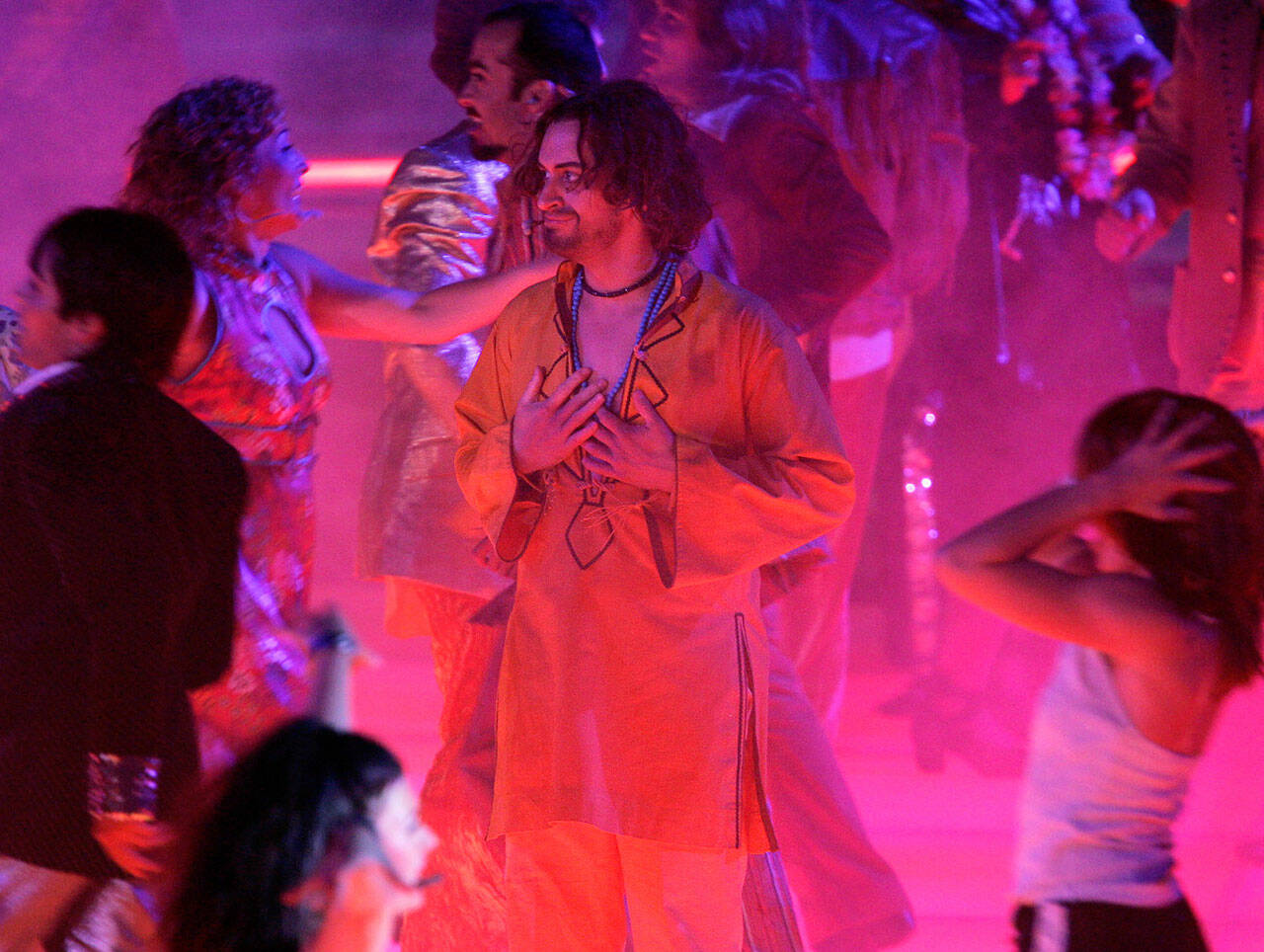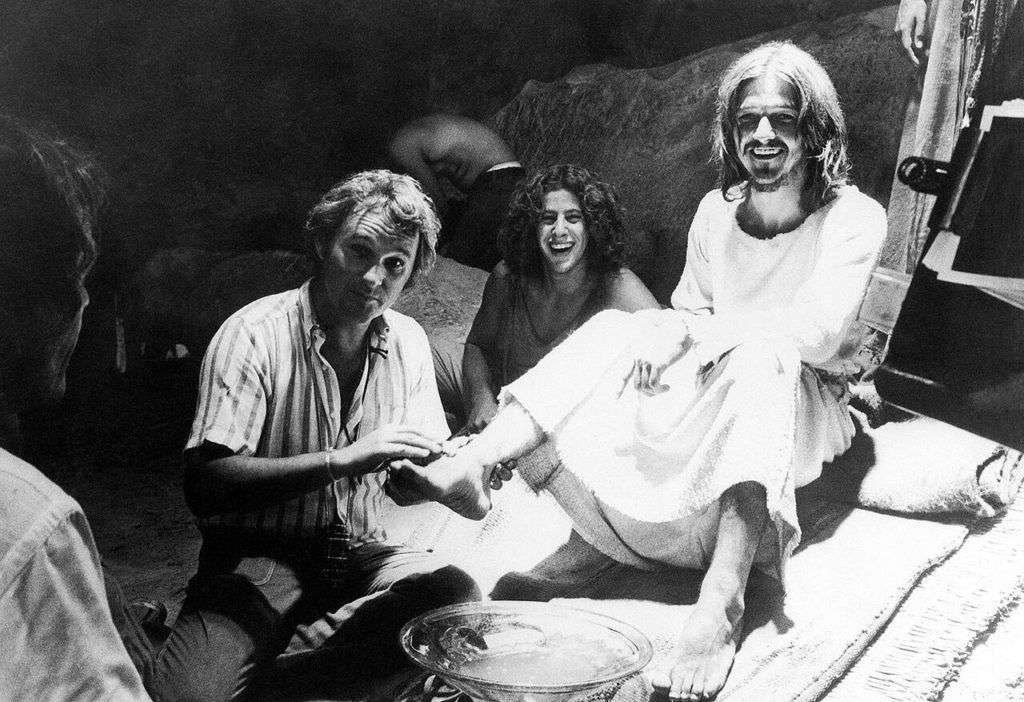By Henry Bial / For The Conversation
In the days leading up to Easter Sunday, Christians around the world will participate in retellings of the story of the last days of Jesus’ life, from his entry into Jerusalem to the Last Supper and to his trial, crucifixion and resurrection. They may walk the Stations of the Cross — a processional ritual marking key points in the biblical narrative — attend a pageant or simply gather in church for religious services.
And some people will view or listen to “Jesus Christ Superstar,” the 1971 rock musical by Andrew Lloyd Webber and Tim Rice. NBC’s “Jesus Christ Superstar: Live in Concert,” featuring R&B star John Legend in the title role, was first broadcast on Easter Sunday 2018 and re-aired for Easter 2020. This year, if you find yourself in Dallas during Holy Week, you might even score a ticket to the latest touring production.
As I detail in my book “Playing God: The Bible on the Broadway Stage,” “Superstar” is the most commercially successful adaptation of a biblical story in Broadway history, with well over 1,000 performances spanning multiple productions. In some ways, this is unsurprising. Church reenactments of biblical scenes were foundational for the development of Western theater, especially the “quem quaeritis trope,” a 10th-century dialogue that reenacts the moment when Jesus’ body is supposedly discovered missing from the tomb. Put another way, Christians have seen drama as an appropriate way to communicate the story of Jesus’ passion and resurrection for more than a millennium.
Yet something about “Superstar” has always seemed a bit improbable, and its depiction of Holy Week set off controversy from the start. Composer Lloyd Webber has recounted how London producers initially regarded the project as “the worst idea in history.” Many religious audiences viewed the play with deep suspicion for what they considered an irreverent approach, questionable theology and its rock ‘n’ roll-influenced score.
As a theater professor, I see “Superstar” as an important step in the evolution of the Broadway musical, a groundbreaking rock opera that paved the way for contemporary hits like “Mamma Mia!” and “Hamilton.” But the musical’s now-canonical status was anything but inevitable.
‘Jesus is cool’: The show’s irreverent attitude is encapsulated in its title song, which combines a soaring choral hook (“Jesus Christ, Superstar, Do you think you’re what they say you are?”) with a series of pointed and ironic questions via rock melody: “Why’d you choose such a backward time and such a strange land?”
Though set in the Jerusalem of 2,000 years ago, the play uses modern language — “Jesus is cool” — and imagery, such as paparazzi following Jesus through the streets. By representing Jesus as a charismatic celebrity whose fame spirals out of control, “Superstar” offers audiences a contemporary framework for understanding the ancient biblical narrative. This is underlined by self-aware lyrics that offer commentary on how the Passion story would go on to be told. During the Last Supper scene, for example, Jesus’ disciples sing:
Always hoped that I’d be an apostle
Knew that I would make it if I tried
Then when we retire, we can write the gospels
So they’ll still talk about us when we’ve died.
For conservative Christians, such lighthearted paraphrasing of Scripture was seen as offensive. More troubling, in the eyes of many religious leaders, was the musical’s theology. “Superstar” is structured similarly to a traditional Christian Passion play, depicting Jesus’ final days. But it abruptly ends with the crucifixion, omitting the resurrection that is at the heart of the Easter story; and Christianity itself. What’s more, the play hints at a romantic relationship between Jesus and his supporter Mary Magdalene, and gives a prominent role to Judas, the disciple whom the Gospels say betrayed Jesus; in fact, Judas is arguably the show’s leading man.
All this caused many Christian leaders to dismiss the show as blasphemous. Others argued that, while well-meaning, “Superstar” was overly focused on Christ’s humanity, to the exclusion of his divinity.
Meanwhile, Jewish organizations expressed concern that the play would inspire antisemitism by perpetuating the idea that Jews bear responsibility for the death of Christ. A trio of Jewish priests sings “This Jesus Must Die,” and later pressures a reluctant Pontius Pilate to have Jesus crucified.
In 1971, this was a particularly sore spot for Jewish-Christian relations. The idea that the Jewish people bore collective guilt for killing Jesus had long been part of antisemitic rhetoric from Catholic leaders like the Rev. Charles Coughlin. In fact, it wasn’t until 1965 that the Vatican officially declared, “what happened in [Christ’s] passion cannot be charged against all the Jews, without distinction, then alive, nor against the Jews of today.”
Rock ‘n’ rebels: Still, most early objections to “Superstar” were driven less by its content and more by its form. The mere idea of turning the Bible into a loud, flashy, rock ‘n’ roll spectacle was often seen as a kind of sacrilege. As religion scholar David Chidester and others have observed, conservative Christian groups have historically complained about the superficial and amoral nature of American popular culture, with particular distaste for its music. In this view, rock lyrics advocate sin while the loud, sensual and unrestrained nature of the music encourages it.
For such critics, “Jesus Christ Superstar” seemed to pose a threat simply by juxtaposing the sacred narrative of the Bible with the profane atmosphere of the rock concert.
Yet half a century after its premiere, the musical no longer generates much controversy. The recognition and appreciation of Jesus’ humanity has gradually become more acceptable among American Christians, though not to the exclusion of his divinity. Compared with earlier generations, Gen X and millennials are less likely to read Scripture, and therefore less likely to be concerned over fine points of theological interpretation.
Rock music, meanwhile, is aging along with its fans, while the rise of the American megachurch has blurred the line between rock concert and church service, between celebrities and spiritual leaders. No longer are electric instruments, flashy costumes, spotlights and microphones seen as disrespectful or inconsistent with worship.
Perhaps most significantly, today’s audiences, both religious and not, may simply have a greater regard for so-called superstars. For many people in the 1970s, the musical’s comparison of the deification of Christ and the idolatry of a rock star was inherently derogatory, undercutting Jesus’ spiritual significance. Yet today, in an era when Lady Gaga has six times as many Instagram followers as Pope Francis, arguably the title — and the musical itself — reads as a more sincere form of appreciation.
Henry Bial is a professor of theater at the University of Kansas. The Conversation is an independent and nonprofit source of news, analysis and commentary from academic experts. The Conversation is wholly responsible for the content.
Talk to us
> Give us your news tips.
> Send us a letter to the editor.
> More Herald contact information.


























